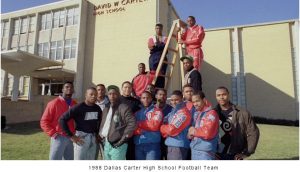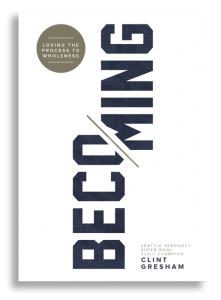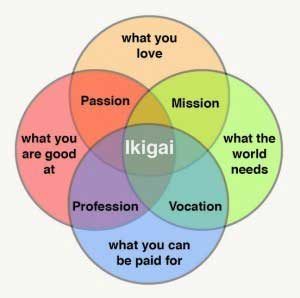Sports offers some great parallels for lessons learned in everyday life. One such lesson was illustrated in a film aired recently on ESPN, and another life lesson was shared in a book written by a family friend, former Seattle Seahawks football player Clint Gresham.
Is it a coincidence that both the film and the book have come out of the state of Texas during a time when Hurricane Harvey has dumped its devastating blow? I don’t think so.
As I watched interviews with those who “lost everything,” numerous Texans reminded us that their material possessions may be gone, but they remain strong, intact and grateful for what matters most—their lives and the lives of those they love. One flood survivor–who also lived through Hurricane Katrina–said this: ““The only home I have is my family. Wherever we go, we’ll go together, and that will be home.” After another survivor swam for a mile to get rescued from the flood waters—with her three-year-old boy clutched in one arm–she said, “If it weren’t for my struggles, I wouldn’t know my strengths.” Hurricane Harvey has created a kind of reservoir that only love can tap into.
When we build our lives on a foundation that gets its energy from what we do and the things we have rather than from who we are being, we’re setting ourselves up for the possibility of losing everything.
 ESPN’s film 30 for 30: What Carter Lost, shares the saga of the Dallas Carter High School football team. With 21 gifted players, Carter won the state championship in 1988. Although they managed to win it all on the field, they proceeded to throw it all away because of some horrible decisions made by several players on their team.
ESPN’s film 30 for 30: What Carter Lost, shares the saga of the Dallas Carter High School football team. With 21 gifted players, Carter won the state championship in 1988. Although they managed to win it all on the field, they proceeded to throw it all away because of some horrible decisions made by several players on their team.
The film exposes what can happen to some people when they become overnight stars. Some of the Carter High football players morphed into unfamiliar and uncharacteristic creatures with an insatiable appetite for fame and fortune, until their lust for having even more got the best of them. We see this happen with famous sports and entertainment stars who enjoy fame, fortune, and the adoration of their obsessed fans … as long as they keep playing or performing well.
But what happens when the athlete or performer can no longer continue to do what made them famous? If they have become addicted to the praise of others and have learned to rely on it, then when that praise and adoration is gone, their entire self-worth and identity disappears with it.
Clint Gresham, former Seattle Seahawks Super Bowl Champion and author of Becoming: Loving the Process to Wholeness, sums it up very eloquently in the preview chapter of his new book (available 9/19/17):
 “Every single one of us wants to matter—to be relevant and accepted and loved. However, not very many people are willing to admit that the way they are trying to meet this basic need will simply leave them wanting more.
“Every single one of us wants to matter—to be relevant and accepted and loved. However, not very many people are willing to admit that the way they are trying to meet this basic need will simply leave them wanting more.
Here’s the bottom line: identity has nothing to do with what you do. It doesn’t matter if you’re a musician or CEO, a mother or father, a boyfriend or girlfriend, a four-star general, or even a Super Bowl-winning football player. Identity is who you are. It’s not something you work for—it’s something you work from. It isn’t created, it’s found. And, once you do, it’s something you have to hold on to and never lose sight of.”
If your identity is based on what you do or the material possessions you have, what happens when you can no longer do what you once did? What happens when a hurricane comes along and you lose every earthly possession you own?
Something very powerful rests at the core of all this—the lens through which you view your life—also known as a paradigm.
 The old paradigm subscribes to the belief that what you do determines what you have, which determines who you will be. One of my happiest and most fulfilled coaching clients was someone who had very little money and earthly possessions. One of the unhappiest clients I ever worked with was a woman who had an abundance of money and material goods, yet her life was hollow and unfulfilling. She kept buying more things to fill a void.
The old paradigm subscribes to the belief that what you do determines what you have, which determines who you will be. One of my happiest and most fulfilled coaching clients was someone who had very little money and earthly possessions. One of the unhappiest clients I ever worked with was a woman who had an abundance of money and material goods, yet her life was hollow and unfulfilling. She kept buying more things to fill a void.
How can one have everything they’ve ever wanted and yet be so empty and unhappy? And how can one have so little and yet be so happy and content? Happiness and fulfillment are not created by material wealth or possessions alone—what you have—but rather by who you are being and what you choose to do with who you are.
Once you get the essentials of food, shelter and clothing taken care of, the most basic human need is to love and be loved–to matter in some way. Unfortunately, so many people try to meet this need in a way that simply leaves them wanting more.
I’m not suggesting that we all take a vow of poverty. There’s nothing wrong with having things. The problems arise when we sacrifice who we are being for the sake of having more. When we do that, we will never have enough.
The new paradigm embraces the belief that when your life choices are informed by who you are being (connecting with your values and vision), what you do (your mission) is a natural extension of this, and what you have (your possessions) is enough.
When you operate under this new paradigm—be so you can do so you can have—you make a shift in your entire belief system. You are no longer willing to negotiate who you are being so you can have more.
Deepak Chopra reminds us that “everyone has a purpose in life . . . a unique gift or special talent to give to others. And when we blend this unique talent with service to others, we experience the ecstasy and exultation of our own spirit, which is the ultimate goal of all goals.”
 According to Japanese culture, everyone has an ikigai--a reason for being. Finding it requires a deep and often lengthy search of self.
According to Japanese culture, everyone has an ikigai--a reason for being. Finding it requires a deep and often lengthy search of self.
I invite you to take some time to consider your ikigai. Who are you at the core? What is your reason for being that makes you want to get out of bed every morning? What gifts and talents make you uniquely you–that can never be taken from you–regardless of what you do for a living or what worldly possessions you have gained or lost?
How does maintaining a focus on who you’re being and why you’re here—your ikigai–shift the lens through which you view the world? Do you notice that you show up differently as a result? Please comment below.
If you’d like additional resources, I offer a couple of guides that may help:

Life Architect – Creating Blueprints for Purposeful & Productive Lives
Kathy@OrgCoach.net www.OrgCoach.net Follow me on Facebook





